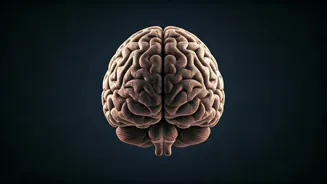What Exactly Is It?
Brain fog isn't a medical diagnosis, but rather a description of experiencing cognitive difficulties. It represents a collection of symptoms affecting
mental clarity. Individuals with brain fog might struggle with memory, concentration, and clear thinking. It’s like having your mental processing speed slowed down. People often find it challenging to focus on tasks, remember information, or express themselves clearly. This state can be triggered by a multitude of factors, and its effects vary from person to person. It can make daily tasks difficult and be a source of considerable frustration, impacting work, studies, and social interactions.
Possible Warning Signs
Several indicators might suggest you're experiencing brain fog. First, memory problems. For instance, you may struggle to remember things you've recently learned or conversations you've just had. Second, difficulty concentrating. This might include getting easily distracted or finding it tough to stick to one task. Third, problems with thinking and processing information. Examples of this could be struggling to find the right words, feeling mentally slow, or experiencing confusion. Other signs might include feeling mentally exhausted, having trouble organizing thoughts, and a general sense of mental sluggishness. The intensity of these symptoms can fluctuate.
Causes of Brain Fog
Brain fog can stem from several causes. Nutritional deficiencies, particularly of vitamin B12 or iron, can contribute to cognitive difficulties. Sleep deprivation and poor sleep quality also play a role. Stress and anxiety, whether from work, personal relationships, or major life changes, are significant contributors. Hormonal fluctuations, like those during menopause or pregnancy, may also be involved. Medical conditions, such as chronic fatigue syndrome, fibromyalgia, and autoimmune diseases, have brain fog as a common symptom. Furthermore, certain medications can have brain fog as a side effect. Lifestyle choices, including diet and exercise habits, have a notable impact as well.
Taking Control
Several strategies can help manage brain fog. First, prioritize sleep and aim for consistent, high-quality rest. Second, manage stress through techniques like meditation, deep breathing, or yoga. Third, make dietary adjustments by ensuring balanced nutrition, staying hydrated, and, if necessary, consulting a doctor about supplements. Regular exercise is crucial for both physical and mental well-being; even light activity like walking can help. Cognitive training exercises, such as puzzles and memory games, may sharpen your mind. Consulting with healthcare professionals is crucial for diagnosis and treatment, especially if brain fog symptoms are severe or persistent.














